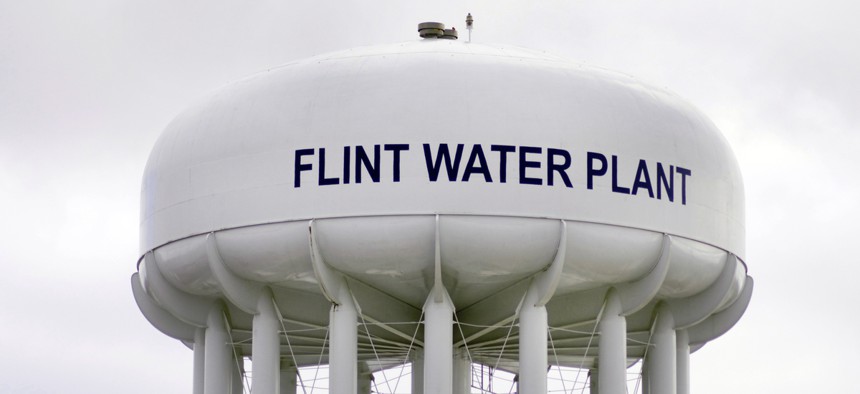Michigan to Pay Flint Residents $600 Million in Water Crisis Settlement

Flint residents reached a settlement with the state for $600 million. Shutterstock
Tainted water exposed children to dangerous levels of lead and left residents using bottled water for cooking, cleaning, and drinking for years. Now it’s time for the state to “do what it can,” said Gov. Gretchen Whitmer.
The state of Michigan has agreed to pay $600 million to Flint residents affected by the city’s water crisis, as part of a settlement to resolve a number of civil lawsuits brought against the state. The settlement comes after years of legal action and calls to hold state and local officials accountable.
The settlement will create a fund to benefit individuals, property owners, and businesses who were impacted by the water crisis, which exposed residents of the city to lead-contaminated water. The fund will be divided between different classes, with around 80% of the money going to children. Of the money going to children, about two-thirds is reserved for children who were six or younger “at first exposure to Flint water,” with the rest going to older children.
At least 25,000 people, including more than 5,000 children under 12, are expected to be eligible to make claims to the fund.
In a statement about the settlement, Gov. Gretchen Whitmer called what the people of Flint have endured “unconscionable.”
“What happened in Flint should have never happened, and financial compensation with this settlement is just one of the many ways we can continue to show our support for the city of Flint and its families,” Whitmer said in a statement. “It is time for the state to do what it can and take this critical step forward.”
Several key details of the settlement, including how the state will come up with the money, have not yet been released. The $600 million amount is more than the state has paid in settlements in the last ten years combined, and is likely the largest amount the state has ever settled for. Experts say that the state legislature will most likely have to appropriate the funds.
Attorney General Dana Nessel said on Thursday that “several things need to happen before this agreement can be finalized and because of those steps, many of the details must remain confidential for the time being.”
The water crisis was sparked by a 2014 cost-saving decision to switch the city’s water source from Lake Huron to the Flint River. Investigators later found that officials failed to add corrosion controls, and corrosive water from the river caused lead contamination from old pipes.
Dozens of lawsuits filed since 2016 accused city and state officials of willfully neglecting a public health emergency, ignoring evidence of the water crisis, and concealing information about the tainted water from residents. Government officials “insisted that the water was safe to drink” and did not acknowledge the problem until “a national spotlight was focused on Flint,” one civil suit charged.
The Flint water crisis drew national attention in 2015 when residents of the largely-Black city raised concerns about brown, odd-smelling water coming out of taps. Then, they began reporting health problems like skin rashes and hair loss. Children began testing positive for lead poisoning, and the mayor declared a state of emergency that year.
An outbreak of Legionnaires’ disease, a form of pneumonia caused by waterborne bacteria, in 2014 and 2015 sickened at least 90 people in the city and killed 12, though some investigators suspected that the toll was much higher than reported because the outbreak was not made known to the public until 2016.
The city’s drinking source was eventually switched back to Lake Huron, but years later, many Flint residents are still suspicious of their taps. Some are drinking, cooking, and cleaning with bottled water, even though the state declared the water safe in 2019. Lead pipes lines are in the process of being replaced, a project which Mayor Sheldon Neeley said last week is 90% complete.
In addition to the settlement, Whitmer said the state government will help the city complete lead service-line replacement. She also said that things like stricter lead water quality standards passed in 2018 and the newly-minted Office of the Clean Water Public Advocate, which she created in a 2019 executive order, will help prevent a similar situation from happening in the future.
Some Flint residents expressed disappointment with the early details of the settlement, including Nayyirah Shariff, the director of the nonprofit Flint Rising, who told the Detroit Free Press that the settlement was "not at all satisfactory." In particular, she raised concerns about how small the individual payouts will be if thousands of people make claims, and the relative lack of support for adults whose physical health has been impacted by the crisis, compared to what is being provided to children.
Whitmer acknowledged that the settlement “may not completely provide all that Flint needs.”
“Many will still feel justifiable frustration with a system and structure that at times is not adequate to fully address what has happened to people in Flint over the last six years,” she said. We hear and respect those voices and understand that healing Flint will take a long time, but our ongoing efforts and today’s settlement announcement are important steps in helping all of us move forward.”
Emma Coleman is the assistant editor for Route Fifty.
NEXT STORY: Meatpacking Companies Dismissed Years of Warnings but Now Say Nobody Could Have Prepared for COVID-19






